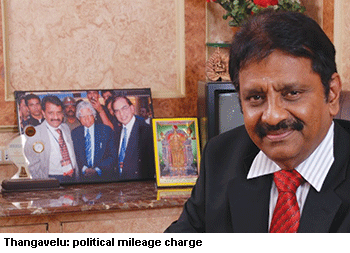 The tragic suicide of 17-year-old Anitha, an aspiring medical student from a Dalit family in rural Tamil Nadu (pop.72.1 million) on September 1, has sent shockwaves across the country and sparked huge protests by several political parties, college students and activists in the state. Anitha’s tragedy was that she averaged 98 percent in the class XII school-leaving exam of the Tamil Nadu State Board of School Education (TNSBSE). Despite this impressive performance she was unable to secure a medical college seat due to her poor score (86/720) in the National Eligibility cum Entrance Test (NEET) 2017, which as per a Supreme Court decree of April 11, 2016 is the sole common entrance exam for admission into all medical and dental colleges countrywide.
The tragic suicide of 17-year-old Anitha, an aspiring medical student from a Dalit family in rural Tamil Nadu (pop.72.1 million) on September 1, has sent shockwaves across the country and sparked huge protests by several political parties, college students and activists in the state. Anitha’s tragedy was that she averaged 98 percent in the class XII school-leaving exam of the Tamil Nadu State Board of School Education (TNSBSE). Despite this impressive performance she was unable to secure a medical college seat due to her poor score (86/720) in the National Eligibility cum Entrance Test (NEET) 2017, which as per a Supreme Court decree of April 11, 2016 is the sole common entrance exam for admission into all medical and dental colleges countrywide.
Anitha took the extreme step on August 22, nine days after the Supreme Court declined to exempt Tamil Nadu from applicability of NEET for admission into the state’s medical colleges, and ordered the state government to begin medical admissions according to the NEET merit list. The August 22 order dashed Anitha’s hopes of securing admission into all medical colleges including medical colleges in Tamil Nadu despite her high class XII marks, which was the basis for admission into all professional education colleges in the state since 2007. In 2006, the late Jayalalithaa-led All India Dravida Munnetra Kazhagam (AIADMK) government abolished all common entrance exams for professional education institutions and decreed class XII scores as the basis for admission, reportedly to afford equal opportunity to rural school leavers.
Throughout the past academic year, the successor AIADMK government has been making desperate political manoeuvres to get Tamil Nadu students exemption from NEET. On February 1, the state legislative assembly passed two Bills to exempt Tamil Nadu students from writing NEET, but the Bills failed to get presidential approval.
Moreover, immediately after NEET 2017 results were declared on June 23, the AIADMK government issued an order stating that after surrendering the mandatory 15 percent of government medical seats in medical colleges in the state to the all-India pool, 85 percent of the remaining seats in Tamil Nadu’s 22 government and ten private medical colleges and four government and 21 private dental colleges will be reserved for class XII graduates of schools affiliated with TNSBSE, out of which 15 percent were reserved for students of CBSE, CISCE and other pan-India exam boards. The objective of the government order was to ensure that TNSBSE students who fared poorly in NEET 2017, compared to students from CBSE and other boards, wouldn’t be shut out of the state’s medical and dental colleges. However, the government order failed to withstand legal scrutiny and after a single judge of the Madras high court struck down the order on July 14, a division bench upheld its decision.
Educationists and analysts in Coimbatore squarely blame the AIADMK government for misleading medical college aspirants like Anitha into believing that Tamil Nadu students would be exempted from NEET. Moreover, they find it specially tragic that the gutsy Anitha who had appealed to the Supreme Court against NEET and also travelled to Delhi to plead her case, should take recourse to suicide. “The AIADMK government continued to give false hopes to medical college aspirants that it would eventually secure TN school leavers exemption from NEET for at least a year. Instead, the state government should have quickly upgraded the class XII curriculum of TNSBSE schools and devised plans to prepare students for NEET. The state government’s sole aim was to gain political mileage out of the NEET issue playing with the future of students,” says Dr. L.P. Thangavelu, founder-promoter of the PPG Group of Institutions, Coimbatore, member of the Medical Council of India and the Tamil Nadu Medical Council.
Informed monitors of Tamil Nadu’s confusing education scene are unanimous that the poor quality of school education dispensed by the state’s 53,000 government and 10,934 private schools affiliated with TNSBSE is responsible for high scorers like Anitha faring badly in national entrance exams. According to them, reckless populist interference and dumbing down of public school standards by successive DMK and AIADMK governments since 2010, has completely wrecked K-12 education in the state.
“The TNSBSE Plus Two curriculum has been dumbed down and rote memorisation from textbooks is encouraged and rewarded. Exam question papers don’t test students’ analytical and knowledge application skills which are required to crack national entrance exams such as the NEET and IIT-JEE,” says R. Visalakshi, president of the Tamil Nadu Private Schools Association.
Clearly, Tamil Nadu, which was once reputed for its excellent school and college education and whose students routinely topped national entrance tests such as IIT-JEE and AIPMT, is paying a heavy price for the political shenanigans of the DMK and AIADMK governments. The best way for the powers-that-be to respond to Anitha’s tragic suicide is to radically reform the state’s declining K-12 education system and restore it to its old glory.
Hemalatha Raghupathi (Chennai)





















